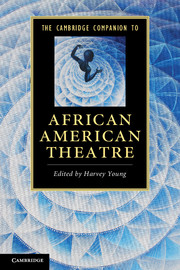Book contents
- Frontmatter
- Contents
- Illustrations
- Contributors
- Acknowledgements
- Chronology
- Introduction
- 1 Slavery, performance, and the design of African American theatre
- 2 Slave rebellions on the national stage
- 3 Early black Americans on Broadway
- 4 Drama in the Harlem Renaissance
- 5 The Negro Little Theatre Movement
- 6 African American women dramatists, 1930–1960
- 7 Amiri Baraka and the Black Arts Movement
- 8 Fragmented musicals and 1970s soul aesthetic
- 9 Spectacles of whiteness from Adrienne Kennedy to Suzan-Lori Parks
- 10 African American performance and community engagement
- 11 Women playwrights who cross cultural borders
- 12 African Diaspora drama
- 13 Black theatre in the age of Obama
- Further reading
- Index
- References
13 - Black theatre in the age of Obama
Published online by Cambridge University Press: 05 December 2012
- Frontmatter
- Contents
- Illustrations
- Contributors
- Acknowledgements
- Chronology
- Introduction
- 1 Slavery, performance, and the design of African American theatre
- 2 Slave rebellions on the national stage
- 3 Early black Americans on Broadway
- 4 Drama in the Harlem Renaissance
- 5 The Negro Little Theatre Movement
- 6 African American women dramatists, 1930–1960
- 7 Amiri Baraka and the Black Arts Movement
- 8 Fragmented musicals and 1970s soul aesthetic
- 9 Spectacles of whiteness from Adrienne Kennedy to Suzan-Lori Parks
- 10 African American performance and community engagement
- 11 Women playwrights who cross cultural borders
- 12 African Diaspora drama
- 13 Black theatre in the age of Obama
- Further reading
- Index
- References
Summary
10 years after writing the essay “equation for black people on stage” I’m standing at the same crossroads asking the same questions. No sweat. Sometimes you can walk a hundred miles and end up in the same spot. The world ain’t round for nothing right? What is a black play? The definition is housed in the reality of two things that occurred recently and almost simultaneously: 26 August 05, playwright scholar poet king August Wilson announces he is dying of cancer, and hurricane Katrina devastated the Gulf Coast. It feels like judgment day. What I’m talking about today is the same and different. I was tidy then. And now Im tidier. Tidier today like a tidal wave.
What is a black play?
A black play is angry.
A black play is fierce.
A black play is double voiced but rarely confused.
A black play got style.
A black play is of the people by the people and for the people.
A black play is smooth but not slick, heavy but not thick, can’t be tamed, often does not comb its hair, wipes its mouth with the back of its black hand or with a linen napkin whichever is more readily available.
A black play is late.
A black play is RIGHT ON and RIGHT ON TIME.
A black play is deep.
A black play is armed / to the teeth.
A black play bows to god then rows the boat ashore.
A black play makes do if it got to / fights / screams / sings / dreams / WORKS IT / talks in code and tells it like it is ALL UP IN YA FACE.
A black play gives you five.
A black play is robust and alive.
A black play is in the house and looking good, too.
A black play is bad motherfucker.
A black play does not exist.
Every play is a black play.
SAY WHAT?
- Type
- Chapter
- Information
- The Cambridge Companion to African American Theatre , pp. 255 - 278Publisher: Cambridge University PressPrint publication year: 2012



